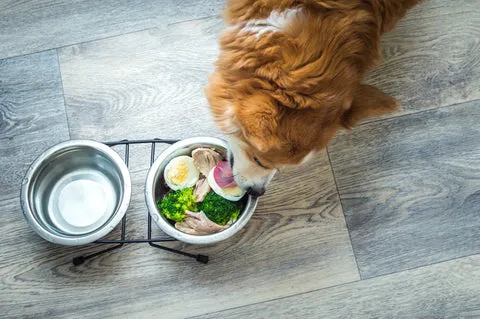When your beloved canine companion isn’t feeling their best, their appetite often takes a hit. Just like humans, dogs can go off their food when they have an upset stomach, a minor illness, or are simply feeling under the weather. As a loving pet parent, knowing What To Feed Dogs When They Are Sick is crucial to help them regain energy, support their recovery, and ensure they receive vital nutrients without further irritating their delicate digestive system. Providing the right nutrition during illness can make a significant difference in their comfort and recovery speed.
Navigating your dog’s dietary needs when they are unwell can be a source of worry, but having a few healthy, nutritious options at the ready can help you feel prepared. Remember, while a bland diet is often recommended, persistent or severe sickness always warrants a visit to your veterinarian for professional advice. This guide will help you understand the best easily digestible and soothing foods to offer your sick dog, along with considerations for dogs prone to allergies or chronic sensitivities. If you’re looking for everyday treats, learn more about what human food can dogs eat as treats for healthier options.
Understanding Your Dog’s Upset Stomach: When to Act
An upset stomach in dogs can manifest in various ways, including vomiting, diarrhea, lethargy, or a general reluctance to eat. Common causes range from dietary indiscretion (eating something they shouldn’t) and stress to more serious underlying health conditions. The goal when feeding a sick dog is to provide nourishment that is gentle on their digestive system, easy to process, and rich in essential nutrients to support healing. It’s about easing their discomfort while preventing dehydration and nutrient deficiencies.
While many mild cases of upset stomach resolve with a bland diet, it’s important to monitor your dog closely. If vomiting or diarrhea is severe, prolonged, or accompanied by other concerning symptoms like extreme lethargy, abdominal pain, or blood in their stool, seek veterinary care immediately. Early intervention can prevent dehydration and address any serious health issues.
10 Best Foods to Offer Your Sick Dog
A plain, bland diet is typically the best approach for a sick dog with an upset stomach. These foods are usually low in fat, easily digestible, and less likely to irritate their sensitive system. Having these options on hand means you can act quickly to provide comfort and support.
1. Boiled White Meat (Chicken or Turkey)
Plain white meat, such as boneless, skinless chicken or turkey breast, is an excellent choice for a sick dog. It provides lean protein that is easy to digest and low in fat, helping to soothe an upset stomach without adding unnecessary strain.
Before serving, ensure all skin and bones are removed to eliminate choking hazards and make the meat even gentler on their digestive system. To prepare, rinse the meat thoroughly, remove any excess fat or bones, then place it in a pot and cover with water. Bring it to a boil, reduce the heat, and simmer for 15-20 minutes until fully cooked. Drain the water, cut the meat into small, bite-sized pieces for easy digestion, and allow it to cool before serving alone or alongside white rice or plain vegetables. This simple meal can be incredibly comforting for a dog feeling under the weather.
 A small Chihuahua dog looking up at a piece of chicken
A small Chihuahua dog looking up at a piece of chicken
2. Plain White Rice
White rice is a staple ingredient in many dog foods and a highly effective option for a sick dog. While brown rice offers more nutrients, the blandness and ease of digestion of white rice make it a superior choice for an upset stomach. It’s often recommended as the perfect accompaniment to boiled white meat.
For dogs experiencing diarrhea, white rice can also help bind their stools, aiding their digestive system in returning to normal function. To prepare, rinse the rice under cold water. Add one part rice to two parts water in a large pan. Bring to a boil, then reduce to a simmer, cover, and cook on low heat for about 18 minutes, or until all the water is absorbed. Let it rest and cool, then fluff with a fork before serving. For more information on what dogs should avoid, check out what foods dogs can t eat.
3. Gentle Sweet Potatoes
Cooked sweet potatoes, served plain, are a fantastic choice for a dog with a sensitive stomach. They are rich in essential vitamins and fiber, making them incredibly gentle on the digestive tract. Sweet potatoes provide vital nutrients such as calcium, iron, and magnesium, which can significantly improve your dog’s overall health and aid recovery.
Never feed your dog raw sweet potatoes, as they are hard to digest and can further upset their stomach. Instead, peel the skins, chop the potatoes into chunks, and boil them until they are soft. Drain the water, mash the potatoes, and allow them to cool completely before serving to your dog. This soft, nutritious food is a great way to help soothe their intestines.
 Sliced cooked sweet potatoes on a wooden surface
Sliced cooked sweet potatoes on a wooden surface
4. Pure Pumpkin
Like sweet potatoes, plain pumpkin is highly effective in soothing an upset stomach and helping a sick dog feel better. It’s packed with vitamins that boost your dog’s immune system and is an excellent source of fiber, which helps regulate digestion and can alleviate both diarrhea and constipation.
You can give your dog up to four tablespoons of pure pumpkin with their regular meal or alongside a bland diet of chicken and rice to support their recovery. When using canned pumpkin, ensure it is 100% pure pumpkin with no added sugar, spices, or other ingredients. Avoid pumpkin pie filling or any seasoned pumpkin products, as these additives could worsen your dog’s stomach upset.
5. Nourishing Homemade Bone Broth
Bone broth is a remarkably beneficial option for sick dogs. It provides essential nutrients and minerals like sodium and potassium, and it’s an excellent way to aid hydration, especially if your dog is reluctant to drink water. Its low carbohydrate content and easy digestibility make it perfect for dogs with upset stomachs.
When preparing homemade bone broth, avoid using garlic or excessive salt, as these ingredients can be toxic or further upset your dog’s digestive system. To make bone broth, add beef or pork marrow bones and chicken or turkey bones to a large cooking pot. Cover them with a few inches of water and simmer on low heat for 20-24 hours. Once done, strain the liquid to remove all bones and bone fragments, then serve the cooled broth to your dog.
 A puppy licking a bowl of bone broth
A puppy licking a bowl of bone broth
6. Specialized Baby Food
For puppies or small dogs struggling with an upset stomach, stage 2 meat-based baby foods such as chicken, lamb, or turkey can be an effective and palatable feeding choice. Baby food is easy to chew and digest, making it suitable for treating an upset stomach and diarrhea.
It’s crucial to carefully check the ingredients list if you opt for baby food. Avoid any products containing additives that could be toxic to dogs, such as garlic or onion powder. Always consult your vet if you are unsure about specific ingredients in your chosen baby food.
7. Easily Digestible Fish
Fish is an excellent source of healthy fats and vitamins, which can significantly benefit your dog’s immune system and overall health when they are recovering from illness. The strong, appealing smell of fish can also entice a sick dog back to its bowl, encouraging them to eat after losing their appetite.
The best way to prepare fish for your dog is by poaching it. Similar to boiling chicken, add the fish to a pan of water, bring it to a boil, then reduce the heat and simmer for 10-15 minutes until it’s fully cooked. Make sure to remove all bones thoroughly and cut the fish into small, manageable pieces before feeding it to your dog. This ensures it’s both safe and easy to digest.
 A Corgi dog eating from its bowl
A Corgi dog eating from its bowl
8. Soothing Oatmeal
Plain, cooked oatmeal, made from rolled oats, can be a soothing food for your dog’s upset stomach. High in soluble fiber, it can help alleviate constipation and contains beneficial antioxidants that may reduce stomach inflammation. It’s a gentle option that provides sustained energy.
While oatmeal is beneficial, it’s important not to overdo it. Due to its high fiber content, too much oatmeal could potentially worsen your dog’s stomach issues. Offer it sparingly and in small amounts, observing how your dog responds.
9. Probiotic-Rich Plain Yogurt
Plain yogurt, specifically varieties full of probiotics and free of added sweeteners, is an ideal food for a dog with an upset stomach. The beneficial bacteria in yogurt aid digestion and support overall gut health. If your dog is experiencing constipation, plain yogurt can help regulate their digestive system and promote healthier bowel movements.
Natural, plain yogurt is readily available at most local stores and supermarkets, making it a convenient option if your dog suddenly becomes ill. It can even be frozen and served as a cool, soothing treat on a warm day, which might be particularly appealing to a dog with a sore throat or lack of appetite.
10. Simple Scrambled or Boiled Eggs
As long as your dog isn’t actively vomiting, eggs are a good food choice that is gentle on the stomach and provides an excellent source of protein. Eggs can also offer a much-needed energy boost if your dog is feeling lethargic after an illness. They are easy to digest and packed with nutrients.
The best ways to cook eggs for your dog are scrambled without butter or oil, or simply boiled. Avoid adding any seasonings or milk. If your dog is currently vomiting, it’s best to avoid eggs completely, as their rich protein content might be too heavy for an extremely sensitive stomach.
 A dog eating scrambled eggs and vegetables from a bowl
A dog eating scrambled eggs and vegetables from a bowl
What to Consider for Dogs with Food Allergies or Chronic Sensitivities
If your dog frequently suffers from an upset stomach or is often sick, it’s highly advisable to consult your vet. They can help determine if your dog has food-related allergies, breed-specific sensitivities, or other underlying health conditions. Identifying the root cause is key to long-term management and keeping your dog healthy. For dogs with chronic sensitivities, opting for specialized diets can be incredibly beneficial. Discover what human food that dogs can eat if you’re looking for safe human food alternatives.
Many conventional kibble products can be problematic for sensitive dogs due to processing methods or specific ingredients. Fortunately, several innovative dog food options are designed with sensitive digestive systems in mind. These foods often feature unique ingredients and preparation methods that prioritize digestibility and nutrient retention.
Cold Pressed Dog Food: A Gentle Alternative
Cold pressed dog food offers a notable alternative to traditional kibble, especially for dogs with food-related allergies or sensitivities. This type of dry food undergoes minimal processing at much lower temperatures compared to conventional kibble, which helps to retain a higher nutritional value of the ingredients.
The unique production method of cold pressed dog food means it breaks down easily and consistently in the digestive system, making it ideal for sensitive stomachs. Designed for improved overall health, it supports digestion and breaks down at a similar rate to raw food, making it suitable to be fed alongside a raw diet if desired. Cold pressed food is often available in a variety of flavors and includes grain-free options, perfect for dogs with grain allergies, providing dense nutrition without upsetting their tummies.
Innovative Insect Protein Cold Pressed Dog Food
For dogs with severe sensitivities or meat-related allergens, insect protein cold pressed dog food presents an innovative and highly digestible option. This complete and nutritionally balanced food is created using the same low-temperature pressing method as traditional cold pressed foods, ensuring optimal nutritional value and aiding digestion.
Insects are not only a sustainable protein source but also offer more protein than common meats like chicken or beef, ensuring your dog doesn’t miss out on essential nutrients. Furthermore, insect protein is naturally hypoallergenic and low in purines, making it an ideal choice for dogs with various sensitivities or specific meat allergies. Like other cold pressed options, this food breaks down gently in the digestive system, allowing it to be fed alone or as part of a mixed diet with raw food.
Benefits of Raw Frozen Dog Food
If your dog is particular about their food or highly sensitive to their current kibble, transitioning to raw food can be an excellent dietary change. Raw food typically uses natural ingredients that have undergone minimal processing and are often grain-free. This approach supports better digestion and can contribute to a healthier coat, skin, and overall well-being.
Raw frozen dog food often comes in various formulations, such as mixes with specific ratios of meat, offal, and bone, or enhanced versions with added vitamins and minerals. These options allow pet parents to customize their dog’s diet by mixing in their own vegetables and minerals, catering precisely to their dog’s specific allergies or nutritional requirements. This tailored approach makes it easier than ever to meet your dog’s unique dietary needs. If your dog struggles with appetite, consider reading what to give a dog that will not eat.
Supporting Your Dog’s Recovery with the Right Nutrition
Knowing what to feed dogs when they are sick is an essential part of responsible pet care. By providing a bland, easily digestible diet, you can help soothe their upset stomach, prevent dehydration, and support their immune system as they recover. For dogs with persistent issues or known allergies, exploring specialized diets like cold pressed or raw food options can offer significant relief and promote long-term digestive health. Always remember that severe or prolonged illness warrants prompt veterinary attention. With the right care and nutrition, your four-legged friend will be back to their happy, healthy self in no time.
